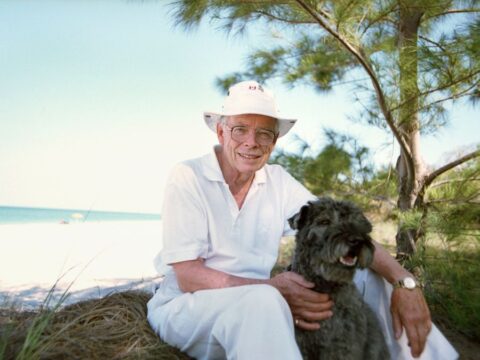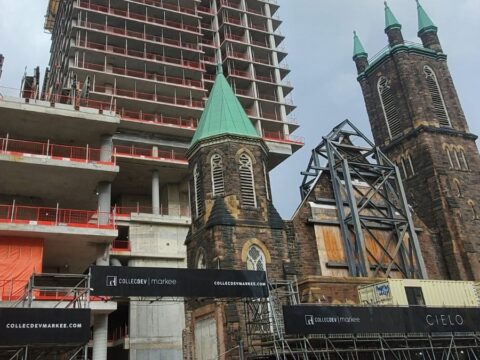Klusmeier is currently on the road with his Tour of a Lifetime, performing in about 250 United churches across Canada. He spoke with Ken Gallinger before a concert in Bracebridge, Ont.
Ken Gallinger: You’ve performed in a lot of churches —
You may unsubscribe from any of our newsletters at any time.
Ron Klusmeier: Two thousand or so.
KG: Wow. So how’s the music scene in the United Church? Is it different from when you started as a church musician and hymn writer 40 years ago?
RK: It varies a lot by region, so it’s hard to make a global statement. I only really know how I’m received by the people who come to my concerts. But the acceptance, the excitement on this trip has been overwhelming. In the early years, there was nowhere I could go where I wasn’t on the receiving end of hostility. And that just doesn’t happen anymore.
KG: Why does contemporary church music make some organists and other church musicians so darned mad?
RK: Some organists see their role more as musician than minister. For some, the church is primarily a venue for performance, and that’s where the problem comes in. Those of us who are just committed to writing stuff that people can sing are often, hmm, I want to say looked down upon —
KG: Dismissed as lightweights?
RK: Yes. But really, it’s hard to write music that’s accessible and still have it be musical, with meaningful theological content. There is a place for performance in worship — even preaching is a form of performance. But when it becomes so theatrical, so concert-hallish, then we lose the worship part of the package.
KG: This is a delicate question: How do you balance excellence in music with the participation of everyone who wants to sing?
RK: I don’t have a problem with that. When we’re driving, some of us have qualities to be a race-car driver; others have trouble getting safely to the mall. But we’re on the road together. It’s like that with music for worship. It doesn’t have to be dumbed down, but it has to be accessible.
KG: You’ve mentioned the variability in the church’s music from place to place. What factors limit congregations in developing good music?
RK: No congregation can do good, rhythmic music without the right leadership. This pushes a button for me. We haven’t trained musicians; we haven’t taken leadership development seriously. And yet everybody wants music in their service. Everybody! And sometimes the demands and pressures on a musician are totally unfair. Like other artists, musicians have strong and weak areas. That’s why I don’t think any one person should ever have a stranglehold on music in a congregation.
KG: Every year, on the first Sunday of Advent, I drag out a recording I got 35 years ago. I’ve transferred it from vinyl to tape, then to CD, and now to my iPhone. It’s you and Kris (your former wife and musical partner) performing O Come, O Come, Emmanuel, and it’s my favourite Christmas recording ever.
RK: I love that arrangement.
KG: But it’s an 800-year-old piece of music that you guys brought to life. How do we take all those old musical treasures and revive them?
RK: You can’t bring them all to life; some weren’t good in the first place. But there are treasures, and we need new arrangements, new charts for them.
KG: Let’s talk about the health of the church as you’re finding it across the country. How are things out there?
RK: Not very good. There are islands where that is not the case, so I need to be clear that I’m generalizing. Granted, there aren’t many of them, but those that are healthy shouldn’t have to wear the mantle of unhealthiness of the rest of the church. But what I’m feeling is a sense of sadness. I don’t sense anger. People are tired.
KG: How do we turn that around?
RK: (Long pause.) I feel a little bit like an 80-year-old priest who’s received a letter from the Vatican saying, “We’ve changed our mind.” This surge of acceptance I’m feeling about what I do, there are moments when I find myself saying privately, “Church, if you could only have grabbed hold of this kind of stuff 30 years ago . . .”
KG: But you say there are pockets of excitement out there. What’s turning people on?
RK: The progressive Christianity movement is having an impact on a surprising demographic. It’s the seniors. They’re getting it. They’ve read it all, studied it and so on. And I’ve seen it all across the country; older people are far more willing to let go of that old stuff. There is something to be said about the wisdom of the elders, as goofy as that sounds. And some people are saying, “I may not buy into a lot of what the church says, but it is the one place where good things can happen, so I’m going to stick with it.” There is an expectation among some people that, whatever other crap is going on, the church is a place where they’re going to find people doing good work on a big scale.
KG: So, is this the end of the road for Ron Klusmeier?
RK: This is it for touring. I wanted to do one more big one, and it’s been great. I love teaching on these tours. When I see people find one little nugget and get excited about it, well, that’s the best.
KG: You’ve made a huge contribution to the United Church. But you’ve paid a price as well. Can you talk about that?
RK: There’s been a huge price. Eking out a living financially has been an awful challenge. And it’s always been. We’ve fought for years and years and years, always trying to see the glass as half full, always thinking, “Maybe this will work.”
KG: The church has never really known how to deal with creative people like you. Others who’ve tried to do what you’ve done find they’re always scratching to make ends meet.
RK: Well, it’s the church, you know. And the very first Observer article about Kris and me, in 1973, asked exactly the same questions about this as you are now. Every week I get a request from someone to use my music at some conference. And inevitably the line comes, “Well, we don’t have much money.” Even the World Council of Churches asks us to submit a new piece in harmony with the theme, and after we submit the piece, they say, “We are not in the habit of paying.”
KG: How does the financial devaluation of your work affect your own sense of the value of what you do?
RK: (Deep sigh.) All I can say is, it does. That’s all I can say.
KG: When the tour finally ends, what’s ahead?
RK: The majority of my songs have never been recorded. It’s in the recording that they come alive, so I will spend a lot of time in the studio. I have more writing to do. And I’d like to do some more large gatherings, “Festival of Faith” type events. As an artist, I’m trying to put into music some of the progressive theology that hasn’t yet had a musical voice.
KG: Are you taking care of you?
RK: Life is as good as it has ever been. Life is good.
***
This story first appeared in The United Church Observer’s April 2013 issue with the title “Music for worship doesn’t have to be dumbed down, but it has to be accessible.”













